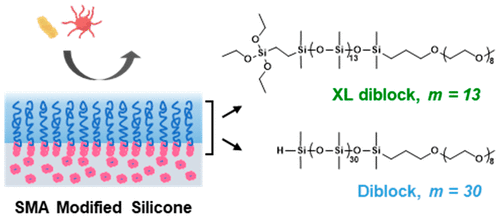当前位置:
X-MOL 学术
›
ACS Biomater. Sci. Eng.
›
论文详情
Our official English website, www.x-mol.net, welcomes your feedback! (Note: you will need to create a separate account there.)
Thromboresistance of Silicones Modified with PEO-Silane Amphiphiles
ACS Biomaterials Science & Engineering ( IF 5.8 ) Pub Date : 2020-03-10 , DOI: 10.1021/acsbiomaterials.0c00011 Bryan Khai D. Ngo 1 , Mikayla E. Barry 1 , Kendrick K. Lim 1 , Jessica C. Johnson 1 , David J. Luna 1 , Navaneeth K.R. Pandian 1 , Abhishek Jain 1 , Melissa A. Grunlan 1, 2, 3
ACS Biomaterials Science & Engineering ( IF 5.8 ) Pub Date : 2020-03-10 , DOI: 10.1021/acsbiomaterials.0c00011 Bryan Khai D. Ngo 1 , Mikayla E. Barry 1 , Kendrick K. Lim 1 , Jessica C. Johnson 1 , David J. Luna 1 , Navaneeth K.R. Pandian 1 , Abhishek Jain 1 , Melissa A. Grunlan 1, 2, 3
Affiliation

|
The antifouling properties of poly(ethylene oxide) (PEO)-silane amphiphiles as surface-modifying additives (SMAs) in a condensation cure silicone have been previously demonstrated against simple protein solutions. Comprising an oligo(dimethylsiloxane) tether (m = 13 or 30) and PEO segment (n = 8), sustained protein resistance was achieved even in the absence of a cross-linkable triethoxysilane group, particularly when comprising the longer tether. To probe their potential for thromboresistance, PEO-silane amphiphile SMAs were used to bulk-modify silicones and evaluated for adhesion resistance against whole human blood under both static and dynamic conditions. Both a cross-linkable (XL diblock, m = 13) and a non-cross-linkable (Diblock, m = 30) SMA were evaluated at various concentrations (5–50 μmol SMA/g silicone) in a condensation cure silicone. Under static conditions, silicones modified with either SMA at concentrations of 10 μmol/g or greater were effective in reducing adhesion of human fibrinogen and platelets. Dynamic testing further showed that modified silicones were able to reduce protein adsorption and thrombus formation. This occurred at 5 and 10 μmol/g for silicones modified with XL diblock, m = 13 and Diblock, m = 30 SMAs, respectively. Combined, these results indicate the effectiveness of PEO-silane amphiphiles as SMAs in silicone for improved thromboresistance.
中文翻译:

PEO-硅烷两亲物改性的有机硅的抗血栓性
先前已经证明了聚(环氧乙烷)(PEO)-硅烷两亲物作为缩合固化有机硅中的表面改性添加剂(SMA)的防污性能,可针对简单的蛋白质溶液进行验证。包含低聚(二甲基硅氧烷)系链(m = 13或30)和PEO链段(n = 8),即使不存在可交联的三乙氧基硅烷基团,尤其是包含较长的系链时,仍可实现持续的蛋白抗性。为了探测其潜在的抗血栓形成性,PEO-硅烷两亲性SMA被用于大量改性有机硅,并评估了其在静态和动态条件下对全人类血液的附着力。可交联的(XL diblock,m = 13)和不可交联的(Diblock,m= 30)在缩合固化有机硅中以各种浓度(5–50μmolSMA / g硅树脂)评估SMA。在静态条件下,用SMA改性的有机硅在10μmol/ g或更高的浓度下可有效减少人纤维蛋白原和血小板的粘附。动态测试进一步表明,改性有机硅能够减少蛋白质吸附和血栓形成。对于用XL diblock(m = 13)和Diblock(m = 30 SMA)改性的有机硅,这种情况分别发生在5和10μmol/ g 。结合起来,这些结果表明,PEO-硅烷两亲物作为有机硅中的SMA可有效改善抗血栓形成性。
更新日期:2020-04-23
中文翻译:

PEO-硅烷两亲物改性的有机硅的抗血栓性
先前已经证明了聚(环氧乙烷)(PEO)-硅烷两亲物作为缩合固化有机硅中的表面改性添加剂(SMA)的防污性能,可针对简单的蛋白质溶液进行验证。包含低聚(二甲基硅氧烷)系链(m = 13或30)和PEO链段(n = 8),即使不存在可交联的三乙氧基硅烷基团,尤其是包含较长的系链时,仍可实现持续的蛋白抗性。为了探测其潜在的抗血栓形成性,PEO-硅烷两亲性SMA被用于大量改性有机硅,并评估了其在静态和动态条件下对全人类血液的附着力。可交联的(XL diblock,m = 13)和不可交联的(Diblock,m= 30)在缩合固化有机硅中以各种浓度(5–50μmolSMA / g硅树脂)评估SMA。在静态条件下,用SMA改性的有机硅在10μmol/ g或更高的浓度下可有效减少人纤维蛋白原和血小板的粘附。动态测试进一步表明,改性有机硅能够减少蛋白质吸附和血栓形成。对于用XL diblock(m = 13)和Diblock(m = 30 SMA)改性的有机硅,这种情况分别发生在5和10μmol/ g 。结合起来,这些结果表明,PEO-硅烷两亲物作为有机硅中的SMA可有效改善抗血栓形成性。



























 京公网安备 11010802027423号
京公网安备 11010802027423号